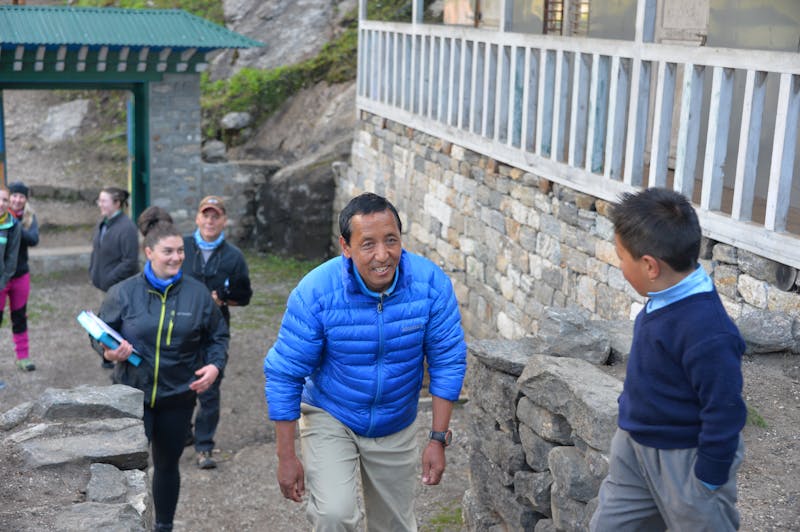I didn’t want to be a climber. My dream since I was young was to become a doctor. But I had to make a choice between my dream and my family. I chose my family.
I was born in Thame, Nepal, around 1960. I’m not exactly sure what year. When I was 12 years old, my father passed away. He was the only breadwinner of the family, and I was the only child who could go out and work to earn. My mother, being a housewife, had no other source of income. I was in fourth grade. I had no choice but to become a porter.
Being a porter will pay you about $5,000 per climb—but only if you get to the top. It’s less if you just go to the base camp. It doesn’t seem like that much, but a dollar here is like 100 over there. So in our minds, it’s worth the risk, because what else are we supposed to do? Back in our village, they do have schooling, but the education isn’t that great. So most people end up climbing to earn money for their families. There aren’t many other opportunities.
I didn’t get that much money from portering. So when I became older, I became a trekking guide. It’s very risky, very dangerous, but you get a little more money. So I started climbing these smalls peaks—6,000 meters. I didn’t summit Everest, which is about 8,800 meters, until 1990.
The first time I climbed to the top, I was excited for the adventure. But to me, it was my job. And it was a very dangerous job. Once, in 2006, two of my Sherpa climbers got buried when ice collapsed in the Khumbu Icefall. One of the climbers was my niece’s husband. Despite many rescue efforts, we were never able to recover their bodies. I had to return back home to my niece without her husband.
The Western people, they always ask about the adventure. But this was very tough. It’s very hard to put it in words. I wish this on nobody.

There were good times on Everest. In 2007, I climbed with a Sherpa-only team. When I am taking clients on the mountain, I have to worry about their physical state and keep an eye on them all the time. But climbing with a Sherpa team was very fun. We didn’t have to pitch tents, carry gears, fix ropes for anybody. We were cracking jokes and climbing at our own pace.
The last time I climbed was in 2011, after 21 summits. My wife made me promise to stop. She said, “You need to build a life.” She said something would happen to me, that I wouldn’t survive. It was a tough decision, but eventually I listened to my wife. Any time I talk to anyone, I say, “You’ve got to listen to whatever your wife says.”
There are big changes on the mountain from when I first climbed to the last time. There is less snow, and more rocks. There used to be house-sized ice pyramids at basecamp, but now you don’t see that. Back then, we had to melt ice and snow for water at basecamp and at Camp II. Now, you can find streams of water at both places.
In 2008, I noticed that all the glaciers all over the mountain were melting. There were messes of human waste all over the road that came from the ice melt. On the mountain, the human waste is not stinky, because it is very cold. So we brought it down in zip-lock bags and dumped it in barrels in the valley. That year, we started bringing human waste down, and collected 17,000 to 18,000 kilograms of it.
There are too many people who want to climb Everest. That’s partly because we only have one climbing season now. We used to be able to try to climb twice a year, in autumn and spring. But now, in the autumn, there are too many avalanches. Now people only try in the spring, and the short window of weather means everybody wants to climb at the same time and on the same day. Everybody’s waiting for the good weather.
I don’t believe we should stop climbing Everest. People who want to climb should be welcome to climb. But I believe the Nepali government should limit permit regulations for climbers so the mountain isn’t so crowded. Climbers also shouldn’t leave any garbage, or their waste, behind.
I want better opportunities for the Sherpa people. When people in America hear the word Sherpa, they automatically think of us as mountain guides. But the word Sherpa literally means people from the east: “Sher = East,” and “Pa = people.” We are an ethnic group believed to have immigrated from eastern Tibet roughly 500 years ago. Not all Sherpas guide on the mountains. Not all of them should have to.
